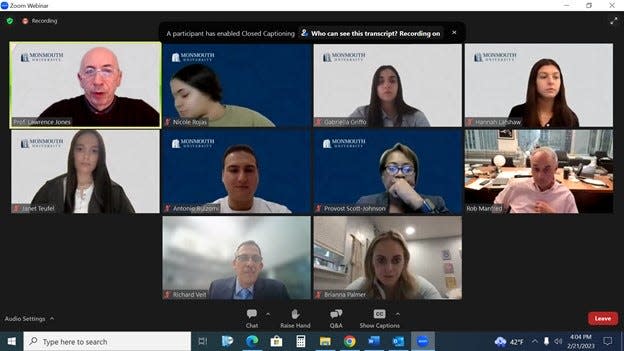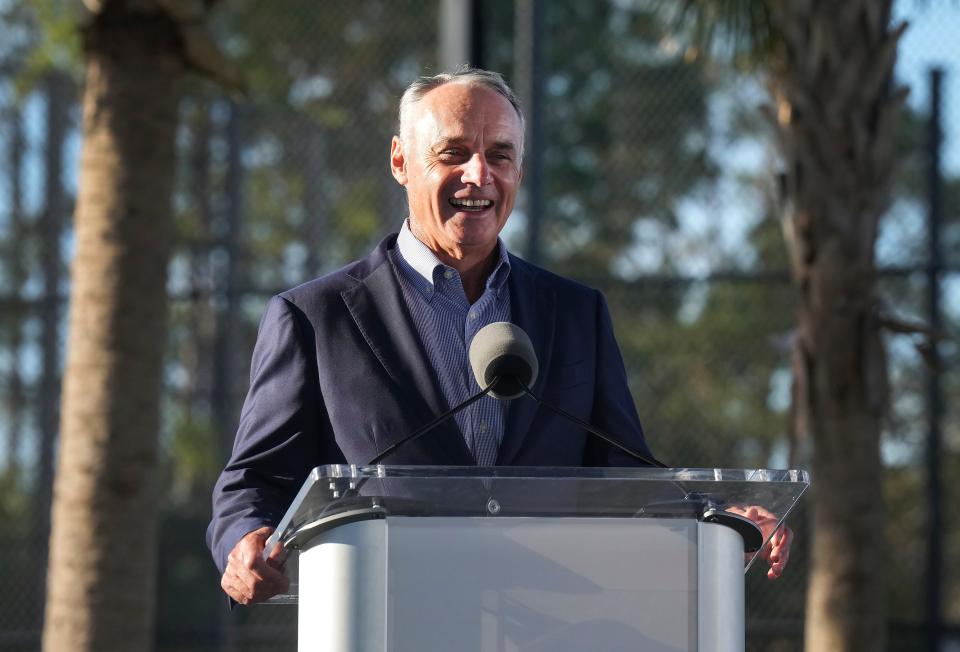No softballs as MLB commissioner grilled by NJ law class on home run record, other issues
A year ago, 16 members of a Monmouth University “Law and Society” course and their professor, retired New Jersey Superior Court Judge Lawrence Jones, submitted an 83-page document to Major League Baseball commissioner Rob Manfred seeking to correct one of the most infamous mistakes in sports history.
Their thoroughly researched petition argued for granting Detroit Tigers pitcher Armando Galarraga the perfect game he was denied in 2010 when an umpire erroneously ruled that the 27th batter, with two outs in the ninth inning, had beaten a throw to first base.
Manfred declined to take action, informing the students last June that such a ruling “would open a Pandora's box of issues from the history of the game where past and future errors would constantly be vulnerable to scrutiny and disputes."

However, he was so impressed with their effort that he met with them for an hour Tuesday, over Zoom, and fielded their questions about the state of the sport.
More on the perfect game that wasn't: Why Armando Galarraga's game was 'perfect,' even if baseball will never call it that
These were no softball queries, either. The students asked about low pay for Minor League Baseball players, the dearth of Black American players at the Major League level and women in front-office positions, steroid-era records, domestic-violence and drug-testing policy, the price of tickets and television blackouts, the use of technology in calling balls and strikes, and potential expansion overseas, among other things.
Manfred answered every question at length, often in great detail, and lauded the students for their diligence in the Galarraga document.
“The reason I read all 83 pages was that the first few were so good,” he told them. “That’s really the truth. I get a lot of things that get sent to me and some things, you know in very short period of time that it’s not going anywere, not worth it.”
He added, “This piece was really, really well done. And while you didn’t get the outcome you were looking for, I hope a little program on a Tuesday afternoon shows there’s some reward for really hard, good work.”
The umpire's view: Blown Detroit Tigers call still haunts Jim Joyce, but he has learned to forgive himself
Some genuine insights
To fans who follow baseball closely, there probably wasn’t any new ground broken during Tuesday's Zoom. But some of Manfred's responses seemed to provide genuine insight into his thinking on complex issues. A few highlights:
On low pay for Minor League Baseball players, who recently unionized: “Despite the fact that I’ve worked on the management side my whole life, I am a great believer that probably the best way to protect worker rights, particularly in a unique industry, is to have a union that is specific to that business. I can’t resist saying a word factually about the situation of Minor League players...A lot of them decide to pursue their dream, and there's lots of professions where when you pursue your dream, you make a choice on economics vs. 'what I think I want to do long-term.'
"You've got to remember that Minor League Baseball is a part-year job. So when somebody says, ‘I only make $10,000 playing Minor League Baseball, well you don't normally work half the year, and they also usually forget to mention that they are provided housing, a pension plan and full health care, which most low-wage workers in the United States are not provided. Another fact that goes under-recognized is most players when they sign their first professional contract they get a signing bonus, most of which are significant...So there’s a broader picture here in terms of what the economics are that is worth understanding.”
Yankees Spring Training tracker: Breaking news, analysis, sights and sounds from Tampa
On the fact that no Black American-born player participated in the 2022 World Series, the nadir of a long trend: “In a lot of communities there just were not sufficient playing opportunities. You can solve that with one thing that solves a lot of problems, and that’s money. We are willing to spend money (on community youth baseball programs) to have a more representative workplace.”

On continued recognition of records set during the steroid era: “Trying to get a coherent, single data set that can be compared across eras is simply impossible. Our view on it, at least now, is fans understand what went on in different eras, how the rules have changed, and they make their own judgments. You saw during (Yankees star) Aaron Judge’s home-run chase that people reacted to that. He was chasing the home-run record. They weren’t talking about 73 (by Barry Bonds); they were talking about 61 (by Roger Maris). Fans can make those judgments.”
Mets Spring Training tracker: Breaking news, analysis, sights and sounds from Port St. Lucie
Manfred mentioned fostering baseball-playing opportunities for girls, in addition to softball, as a way to open a pipeline to having more women in the sport’s font offices. He raved about the accuracy of computer-automated balls and strikes as tested at the minor-league level, but rejected the label of “robot umpires” and said the technology's suitability at the Major League level is still being studied. He decried the notion that baseball tickets are too expensive, but agreed that every fan should be able to watch their team’s game broadcasts — and foresees broader streaming access coming soon.
He also cited his favorite baseball movie as “Field of Dreams,” the 1989 classic starring Kevin Costner.
‘Such a great opportunity’
Manfred closed the session by praising the thought-provoking questions. The students were likewise appreciative of the give-and-take.
“I thought this was such a great opportunity,” said Hannah Latshaw, one of the students who helped produce the Galarraga document and asked Manfred questions Tuesday. “Never in million years did I think I would be speaking to the MLB commissioner. It just shows that as a student, hard work pays off.”
Fellow student Antonio Bulzomi lamented Manfred’s “unfortunate decision” on their petition, but added, “It was really awesome to be able to discuss some of the other social aspects we were thinking about as we were writing this whole proposal.”
Gabriella Griffo, who asked about women in the front office, said while “it doesn’t seem like there’s been a substantial amount of progress,” change in the near future "seems like it’s attainable.”
Janet Teufel, who asked about Minor League players’ salaries, said she appreciated that Manfred “answered the question so thoroughly.”
Jones, the professor, thought his students knocked it out of the park.
“I was extraordinarily impressed with all of them,” he said. “You’re talking with the commissioner of Major League Baseball. They could have been intimidated, and they weren’t intimidated at all.”
Jerry Carino is community columnist for the Asbury Park Press, focusing on the Jersey Shore’s interesting people, inspiring stories and pressing issues. Contact him at jcarino@gannettnj.com.
This article originally appeared on Asbury Park Press: Rob Manfred on Aaron Judge HR record, Galarraga perfect game

